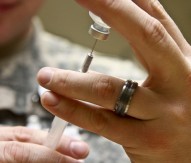
PROFILE: The fight against prostate cancer
A nanostructured material has reduced the proliferation rate, prevented the clustering and reduced the adhesion of cancerous prostate cells. This material may assist the search for treatments of prostate cancer.
In an ambitious project, scientists from three institutions in Grenoble, Université Joseph Fourier, CNRS and CEA, are developing a nanostructured 3D polyelectrolyte scaffold that is connected to a microfluidic biochip to examine the influence of the microenvironment on cancerous prostate cells and to identify new biomarkers for prostate cancer. The biochip will allow the secretions from prostate cancer cells to be collected in real-time.
This group of scientists recently found that a positively-charged polyelectrolyte film of several nanometres in thickness, termed PAH, reduced the proliferation rate of PC3 cells, a model of advanced cancer cell line. Significantly, the clustering phenotype of the PC3 cells was prevented by that nanostructured film. This film reduced the number of specialised adhesion proteins that the PC3 cells normally express to be able to stick to a surface outside the cell.
Promising potential
According to Professor Donald Martin, co-ordinator of the entire project and leader of the research team at the Université Joseph Fourier: “These results provide a very practical outcome, to direct the behaviour of cancerous cells through the design of the nanostructured polyelectrolyte micro-environment.”
Although the properties of surfaces are generally developed for biomedical applications to enhance the adherence and growth of cells, this approach offers a tool to fine-tune the responses of tumour cells through the control of the mechanical and biophysical properties of nanostructured polyelectrolyte surfaces.
Dr Nathalie Picollet-d’hahan, the leader of the research project at the CEA-BGE/Biomics, commented: “Our results also give the basis for engineering new 3D biochip systems, toward a prostate-on-a-chip, to provide insights into the mechanisms that control the growth of tumours and to discover new types of biomarkers for prostate cancer.”
The results from the scientists provide support for their goal to develop a 3D biochip to investigate the response of cancer cells to changes in their micro-environment.
Based on the current findings, the ultimate goal of this project is to use this 3D biochip to discover diagnostic tools that will improve outcomes for men with suspected prostate tumours. This group of scientists believes that the development of 3D biochip diagnostic tools will have a major public health benefit.
Professor Donald Martin added: “We are currently building a multidisciplinary consortium to approach the Horizon2020 programme for further support.”
The research detailed above was funded by the Agence Nationale de Recherche in France and has been published in the journal Biomaterials.

Professor Donald Martin
Principal Investigator
+33 (0)4 5652 0095






